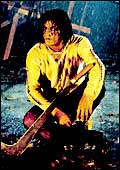|
In
the typical Indian movie, when things go horribly wrong, it takes
the good hero to effect a dramatic rescue. But in the case of
Kannada film industry, popularly called Sandalwood (like Mumbai's
Bollywood, Kolkata's Tollywood and Chennai's Kollywood), it has
taken villains, and a series of them, to save the day.
Given up for dead five years ago, Sandalwood
has staged a stunning comeback, thanks to a string of violent
movies with names like Mental Manja, Deadly Soma, Rakshasa (demon),
Udees (as in, "finish" someone off), Lathi Charge, and
Encounter Dayanak. While in 2000, it wasn't unusual for eight
out of every 10 Sandalwood films to bomb at the box office, today
the success rate is running at an impressive 65 per cent. Forty
per cent of the movies released last year have made at least twice
the sum invested and 20 per cent of them are "super-duper"
hits (that is, more than 100 days of successful screening in theatres
and at least a five-time return on investment). "I can't
recall the last time things looked so rosy for the industry,"
beams H.D. Gangaraj, President of Karnataka Film Chamber of Commerce
(KFCC), and a Sandalwood veteran of three decades.
Part of the turnaround is due to an influx
of new faces into the industry, which was dominated for a long
time by ageing actors (it had two screen gods, Rajkumar and Vishnuvardhan,
76 and 56, respectively). "How credible is a 60-year-old
hero prancing around with a girl old enough to be his granddaughter?"
asks a leading producer. "I guess moviegoers finally voted
with their wallets," he adds. What also helped is Sandalwood
managing to stall simultaneous release of non-Kannada movies in
the state. As a result, distributors of Hindi and English movies,
among others, can sell only 10 prints within the state in the
first seven weeks of their release nationwide.
Then, producers and exhibitors have been
experimenting with innovative marketing and movie-going experience.
While the internet and SMS have been among the predictable tools,
what must be unique to Sandalwood is "olfaction" in
theatres. Hold your breath, this is how it works: You are watching
a Kannada movie and up comes a song-and-dance sequence. Suddenly,
from hidden nooks in the movie hall, perfume is automatically
sprayed on the audience to enhance the mood of the moment. "Some
exhibitors tell me that it actually works," says Vasudeva
Murthy, Vice President of KFCC.
 |
| Violently good: Shivraj in Rakshasa
and Jogi (above) |
 |
What's worked most of all, though, is the
industry touching the right chord. Karnataka's it prosperity (confined
to a handful of cities like Bangalore and Mysore) has left the
core of Sandalwood's audience untouched. While the city slickers
are enjoying a conspicuous boom in consumption, a large number
of illiterate or poorly-educated youth still lives in poverty.
"Typically, in these movies, the hero turns against the society
and takes the law into his own hands, because of which he is seen
as a modern-day Robin Hood," says Dr L. Manjunath, a Bangalore-based
psychiatrist. "It's a cry of despair," he notes.
Deadly Soma, for instance, is the story of
a real life ruffian killed by the local police. Jogi, another
hit movie, is about an innocent village youth forced by circumstances
to resort to violence (in Sandalwood movies, a long blade, called
Macchu, is the weapon of choice) to get his due share of justice.
In fact, in several movies, the leading star has often been the
real life ruffian himself. Gangaraj defends the producer's current
thematic obsession: "They will cater to whatever the market
wants."
The number of movies being produced in Sandalwood
is coming down (103 in 2003, 82 in 2004, and just 75 last year),
but the quality and box office hits have gone up. Like K.M. Veeresh,
Editor of Chitraloka.com, a popular bilingual website on Kannada
movies, says, "For a producer, the safest bet today is to
invest in a Kannada movie, simply because they have a better success
rate than those of Hindi, Telugu and Tamil." As long as the
Mental Manjas and Deadly Somas inspire only box office sales and
not violence in the streets, Sandalwood can safely continue to
glorify them on the silver screen.
|






